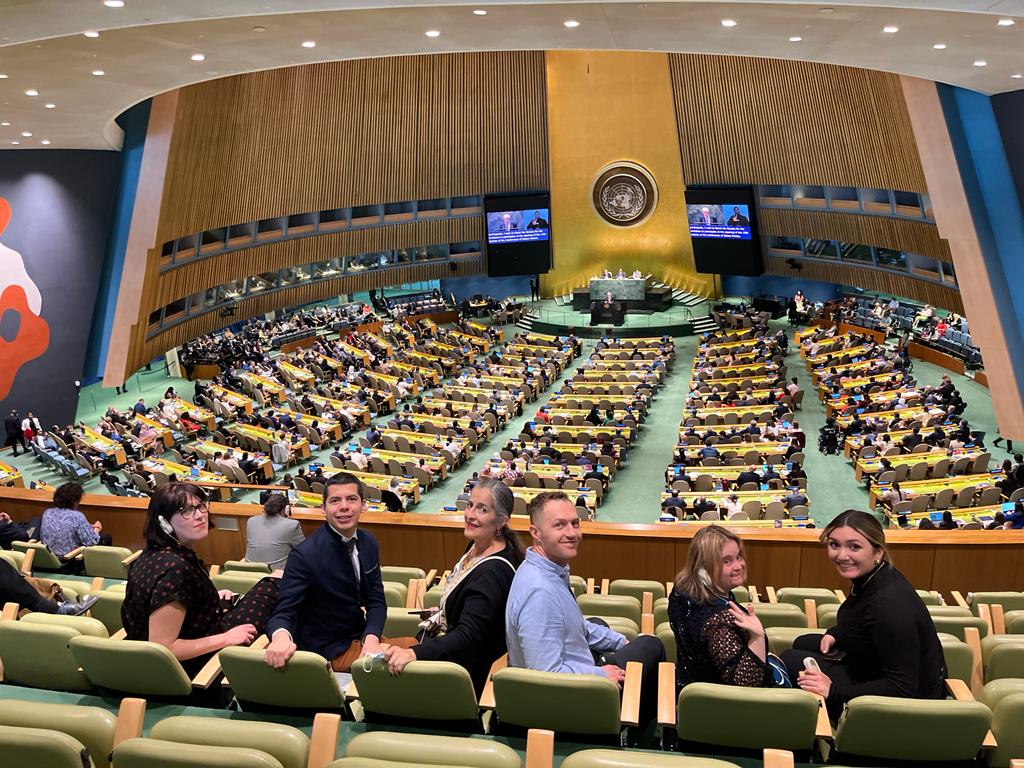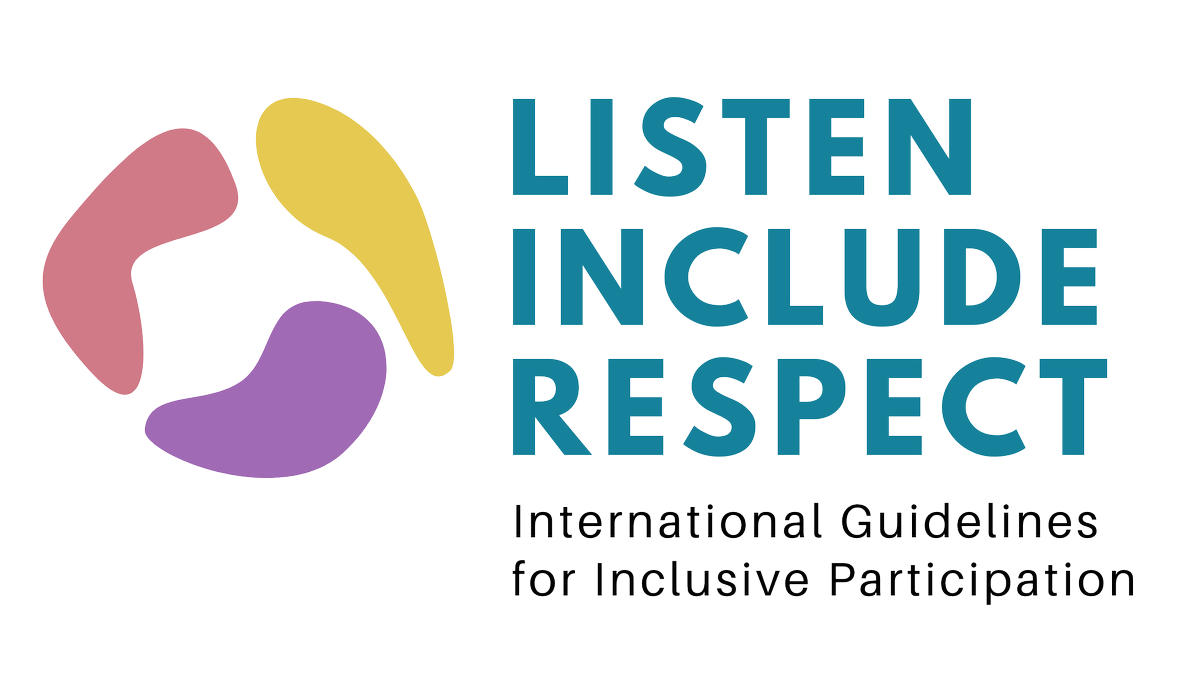
🔴Join us at the #Community2030 side event, starting now!
📢@mhiri_manel of @InclusionIntl, self-advocate Camila Lozano Ruiz of @AsdownColombia, and @FatmaWangareHaj of @inclusionafric1 will be sharing the perspectives of people with intellectual disabilities & their families.
📢@mhiri_manel of @InclusionIntl, self-advocate Camila Lozano Ruiz of @AsdownColombia, and @FatmaWangareHaj of @inclusionafric1 will be sharing the perspectives of people with intellectual disabilities & their families.
https://twitter.com/IDA_CRPD_Forum/status/1536702496789372928
.@mhiri_manel of @InclusionIntl is speaking on behalf of the @IDDC #CBID Task Group, which has been leading regional dialogues on key topics, including community support. 

.@mhiri_manel of @InclusionIntl:
"Key recommendations that came across for improving community support is the presence & implementation of legal frameworks & policies stressing #CRPD Article 19 as well as participation of persons with disabilities and their families."
"Key recommendations that came across for improving community support is the presence & implementation of legal frameworks & policies stressing #CRPD Article 19 as well as participation of persons with disabilities and their families."
.@mhiri_manel: "We are convinced of the importance of inclusion and meaningful participation of persons with disabilities and their representative organizations (#OPDs) in all levels of work, from decision-making & policy design to advocacy and service provision" @iddcconsortium 

.@mhiri_manel: "@iddcconsortium recognizes this important momentum to work on community support and the care agenda; and we are looking forward to putting our efforts together towards a better implementation of #CRPD Article 19"
Self-advocate Maria Camila Lozano from @AsdownColombia is speaking now to answer the question - "what do people with intellectual disabilities need and want for community inclusion?" 

Self-advocate Maria Camila Lozano from @AsdownColombia:
"People with intellectual disabilities don't want to be excluded, and many times this happens. Our participation is the solution"
"People with intellectual disabilities don't want to be excluded, and many times this happens. Our participation is the solution"
Self-advocate Maria Camila Lozano from @AsdownColombia: "We want to form our own families and make our own decisions about sexuality and sexual and reproductive health. We want opportunities to live with our families and in our communities" 

Self-advocate Maria Camila Lozano from @AsdownColombia:
"We want to make our own decisions, and in some situations we don't have the support to do this. but everything is in our hands, if we are given the opportunity to act"
"We want to make our own decisions, and in some situations we don't have the support to do this. but everything is in our hands, if we are given the opportunity to act"
Self-advocate Maria Camila Lozano from @AsdownColombia:
"We want governments to help us and recognize the need for us to live independently - we are capable, we want to be recognized like every other person."
"We want governments to help us and recognize the need for us to live independently - we are capable, we want to be recognized like every other person."

Self-advocate Maria Camila Lozano from @AsdownColombia:
"We don't want compassion - we want support. This is necessary to us in every space so we can participate freely, and that our voices are head. Society needs to trust us, so we can eliminate barriers."
"We don't want compassion - we want support. This is necessary to us in every space so we can participate freely, and that our voices are head. Society needs to trust us, so we can eliminate barriers."

Inclusion Africa's @FatmaWangareHaj on the role of families:
"In sub-Saharan Africa where there is a lack of support, families provide informal supports to their children. The role that families play remains unrecognized and is not a priority to many governments"
"In sub-Saharan Africa where there is a lack of support, families provide informal supports to their children. The role that families play remains unrecognized and is not a priority to many governments"
.@FatmaWangareHaj @inclusionafric1:
"When a family has a child with a disability, stigma and discrimination starts right from birth. This starts with children not being registered at birth, making it much harder to access to education, social protection, health, and more.
"When a family has a child with a disability, stigma and discrimination starts right from birth. This starts with children not being registered at birth, making it much harder to access to education, social protection, health, and more.
.@FatmaWangareHaj @inclusionafric1:
"Access to assistive devices is also a huge challenge, the lack of access means people with disabilities continue to be hidden at home, not able to get out and be included in their community"
"Access to assistive devices is also a huge challenge, the lack of access means people with disabilities continue to be hidden at home, not able to get out and be included in their community"
.@FatmaWangareHaj of @inclusionafric1:
"There are significant pressures for families with financial security, physical health, and mental health - and the more these families go through, the further their children are excluded"
"There are significant pressures for families with financial security, physical health, and mental health - and the more these families go through, the further their children are excluded"
.@FatmaWangareHaj of @inclusionafric1:
"We have heard form families about their fear of what will happen to their son or daughter when they die - they fear that they will end up in institutions if communities are not inclusive"
"We have heard form families about their fear of what will happen to their son or daughter when they die - they fear that they will end up in institutions if communities are not inclusive"
What do families want?
"Families want to be recognized for their care roles.
They want information in accessible formats so that they can relay this information - on services, social protection, and more - to their family member."
- @FatmaWangareHaj of @inclusionafric1
"Families want to be recognized for their care roles.
They want information in accessible formats so that they can relay this information - on services, social protection, and more - to their family member."
- @FatmaWangareHaj of @inclusionafric1
What do families want?
"Families want investment in community-based responses that facilitate inclusion of people with intellectual disabilities - this might take the form of respite care, inclusive education, personal assistance, and more"
- @FatmaWangareHaj of @inclusionafric1
"Families want investment in community-based responses that facilitate inclusion of people with intellectual disabilities - this might take the form of respite care, inclusive education, personal assistance, and more"
- @FatmaWangareHaj of @inclusionafric1
.@FatmaWangareHaj of @inclusionafric1:
"Families of persons with high support needs are completely excluded from conversations about disability. They don't have the chance to attend meetings or participate in policy review. We need specific recognition of these families"
"Families of persons with high support needs are completely excluded from conversations about disability. They don't have the chance to attend meetings or participate in policy review. We need specific recognition of these families"
.@FatmaWangareHaj of @inclusionafric1:
"The role of caring is a burden that falls on women - we see this from early ages, with girls to mothers and grandmothers. The burden of care is not recognized or quantified."
"The role of caring is a burden that falls on women - we see this from early ages, with girls to mothers and grandmothers. The burden of care is not recognized or quantified."
.@FatmaWangareHaj: "There are exciting initiatives to address this by @inclusionafric1 members in Kenya, Zanzibar, and Ghana - supported decision making, peer support groups, respite services, and more - many of these programmes are purely family led"
.@FatmaWangareHaj: "Children with disabilities may be killed at birth if they are seen by their community as a burden. This forces families to take their children to institutions, which they don't want - they are forced to choose their child's survival or institutionalization"
We are encouraged to see so much recognition of the essential voices of both self-advocates and families of people with intellectual disabilities in the discussions about #Community2030 and the future of social care and community-based inclusive development!
• • •
Missing some Tweet in this thread? You can try to
force a refresh







